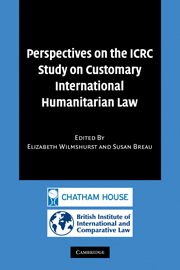Book contents
- Frontmatter
- Contents
- Preface
- List of contributors
- Table of cases
- Table of treaties and other instruments
- Abbreviations
- Part 1 Setting the scene: Theoretical perspectives on international law in the ICRC Study
- Part 2 The status of conflict and combatants: The ICRC Study
- Part 3 Commentary on selected Rules from the ICRC Study
- 6 The law of targeting
- 7 Protected persons and objects
- 8 Natural environment
- 9 Specific methods of warfare
- 10 Weapons, means and methods of warfare
- 11 Fundamental guarantees
- 12 Status and treatment of prisoners of war and other persons deprived of their liberty
- 13 Displacement and displaced persons
- 14 Implementation and compliance
- 15 War crimes
- Part 4 Conclusions
- Index
11 - Fundamental guarantees
Published online by Cambridge University Press: 09 July 2009
- Frontmatter
- Contents
- Preface
- List of contributors
- Table of cases
- Table of treaties and other instruments
- Abbreviations
- Part 1 Setting the scene: Theoretical perspectives on international law in the ICRC Study
- Part 2 The status of conflict and combatants: The ICRC Study
- Part 3 Commentary on selected Rules from the ICRC Study
- 6 The law of targeting
- 7 Protected persons and objects
- 8 Natural environment
- 9 Specific methods of warfare
- 10 Weapons, means and methods of warfare
- 11 Fundamental guarantees
- 12 Status and treatment of prisoners of war and other persons deprived of their liberty
- 13 Displacement and displaced persons
- 14 Implementation and compliance
- 15 War crimes
- Part 4 Conclusions
- Index
Summary
Introduction
The phrase ‘fundamental guarantees’ which appears as the title to Chapter 32 of the Study does not appear to be a term of art. Whilst it is to be found in treaty law, it is only in the title to Article 75 of Protocol I of 1977 to the Geneva Conventions of 1949 and in the title of Article 4 of Protocol II. The phrase is not found within the provision itself. This suggests that ‘fundamental guarantees’ is simply a label and a way of bringing together certain rules which have something in common, something that generally is not found in other rules.
The obvious definition would be rules which apply irrespective of the status of the individual. That would suggest that such rules represent a bottom line. In that case, given that those with a particular status may be protected by other provisions, the concept would need to be further clarified. Fundamental guarantees are those rules which apply irrespective of the status of the individual and where they are not protected by any other provisions of international humanitarian law. As it stands, this definition might still be too broad. It would apply to the treatment of persons both during military operations and also when in the power of the other side. The first situation is regulated by other rules. The second situation needs to be analysed further.
- Type
- Chapter
- Information
- Publisher: Cambridge University PressPrint publication year: 2007



